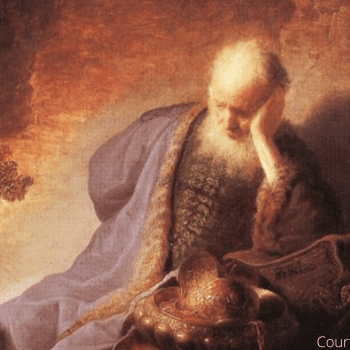 Monday: Read Philippians 1:1-11
Monday: Read Philippians 1:1-11
The book of Philippians is widely acknowledged to be one of Paul’s 4 Prison Epistles (Ephesians, Philippians, Colossians, and Philemon) which was written in Rome.
Philippians opens with a salutation (“Paul and Timothy”: 1-2). This is followed by Paul’s customary thanksgiving (3-8). This opening section closes with Paul’s prayer (9-11).
In his thanksgiving, Paul rejoices in the fact that they have been partners with him in the gospel (5). Paul affirms that God who began a good work in them will carry them through to the end (6).[2] Moises Silva notes, there is “tension that exists between the believers’ accountability for their own spiritual conduct and their need to rely totally on God’s grace in order to meet that obligation.”[3] This corresponds to what Paul said in Gal 3:3 “having begun by the Spirit are you being perfected by the flesh?”
To the Philippians, however, Paul assures them that God “will” bring it to completion (6). Paul adds, “it is only right for me to feel this way about you” (7). He then proceeds to list reasons for his confidence in them. Paul reminds them that they remained faithful to him even in midst of his imprisonment (7).
Paul concludes with a prayer for them (9-11). He prays that their love may abound more and more (9). He prays that they would continue in “real knowledge and all discernment” (9). Paul does so with the hope that they may continue to “approve things that are excellent” (10; see Rom 2:18). His prayer also intends that as a result they may become “sincere and blameless” at the end (11).
Questions to ponder/discuss:
- We like to take comfort in Phil 1:6 and Paul’s assurance that God will complete the work He began in our lives. And there is merit to this. But note that Paul says that the reason why he is confident that God will complete the work He began in them is because of what they have done (1:7). Do you think we can affirm the promise of Phil 1:6 if we are not faithful?
Tuesday: Read Philippians 1:12-26
Today’s reading provides an account of Paul’s circumstances. It may be that one of Paul’s reasons for writing was that the Philippians were concerned with Paul’s well-being. Paul assures them that all that has happened to him has only served to advance the gospel (12, 25: note “to advance” frames this section).
Paul explains that his imprisonment has not hindered the work of the Gospel. After all, the “whole praetorian guard” has come to hear the gospel (13). In addition, Paul’s faithfulness in the midst of imprisonment other Christians are preaching more boldly (14).
Paul adds that there were some who were opposing him (we do not know who they were nor why they were doing this), but even then the Gospel is progressing (15-17). They were preaching out of “envy” (15). Paul, somewhat surprisingly, affirms that at least the gospel is still being preached.
Paul relays his attitude in the midst of his imprisonment. He begins with, “I rejoice (18). Why? Because Paul says, “I know that this shall turn out for my deliverance” (19)
Paul then affirms, which might be one of his more famous statements, “to live is Christ and to die is gain” (21). Paul is torn between his personal desire to depart (23) and the necessity of remaining and having a fruitful ministry, which is in the best interest of the church in Philippi (24). Paul concludes, “I know that I will remain” (25).
Questions to ponder/discuss:
- Paul teaches us that when difficult circumstances arise we should look to see how God might be using them to advance the Gospel. Have you had experiences that were full of difficulties and yet God brought about something great from it? (of course, we are referring to God bringing about great with regards to the kingdom and not our personal gain) If not, pray that God will grant you faith in the midst of trouble and help you to see the work of the kingdom that is advancing as a result.
Wednesday: Read Philippians 1:27-2:4
Philippians 1:27-4:1 is one of the central passages in the NT for Christian living. Paul lays out what it means to grow in “sanctification”: that is, growing in the likeness and image of Christ.
He begins with, “conduct yourselves in a manner worthy of the gospel of Christ” (27). This is likely his key theme for Philippians. Paul adds, “to you it has been granted . . . not only to believe . . . but also to suffer for His sake” (29).
Paul continues, “make my joy complete” (2:1). How are they to do this? By being unified. Paul appeals to them: “do nothing from selfishness or empty conceit” (3) But instead, they should, “with humility of mind regard one another as more important than yourselves” (3). Paul adds, “do not merely look out for your own personal interests” (4). But instead, they should, also consider “the interests of others” (4).
Questions to ponder/discuss:
- “Conduct yourselves in a manner worthy of the gospel of Christ” (27). Whatever the circumstances of life, may this be our ambition.
- We should note that this statement has significant political implications. It suggests that we should live according to the gospel and not according to the standards of being a good citizen in Philippi, Rome, or wherever we may live.
- Suffering for Christ is a central part of the gospel message. In fact, cross-bearing is a fundamental feature of following Jesus (Mark 8:34). Reflect on the following verses and then pray for the persecuted church and for God’s grace and peace for yourself: (Acts 14:22; 1 Thess 3:3-4; 2 Thess 1:4-7; Rom 8:17; 2 Cor 4:8-11; 2 Tim 2:12; 1 Pet 4:13 Col 1:24; Phil 3:10).
- The call to not look for our own interests is another way of stating the highest Christian ethic of love. Love considers others first (see: 1 Cor 10:24). This must begin in our closest relations and then extend towards all.
Thursday: Read Philippians 2:5-11
Philippians 2:5-11 is considered a hymn. It may have been something that Paul wrote. Or it may be something that Paul simply used. Either way, it is one of the classic hymns in the NT. The hymn connects with the previous passage in that it provides an illustration of what considering others first looks like.
Paul begins by exhorting them “Have this attitude in yourselves which was also in Christ Jesus” (5). Paul then illustrates exactly what this meant for Christ.
The hymn is broken into two parts: 2:6-8 emphasize Jesus’ humiliation; 2:9-11 emphasize Jesus’ exaltation.
The first part of the hymn illustrates Jesus’ acts of humiliation and proceeds in three stages.
First, he begins with the fact that Jesus was eternally God: “He existed in the form of God” (6). Yet, he willingly chose to become human: He “emptied Himself, taking the form of a bond-servant, and being made in the likeness of men” (7).
Second, not only did Jesus humble Himself by becoming human. He also humbled Himself by His willingness to die: “He humbled Himself by becoming obedient to the point of death” (8).
Third, Paul notes that Jesus not only became obedient to death but “even death on a cross” (8).
The second part of the hymn emphasizes Jesus’ exaltation. Note that His exaltation was a result of His humiliation: “For this reason also, God highly exalted Him” (9).
God’s exaltation of Jesus included giving Him “the name which is above every name” (9). This is likely a reference to the divine Name “Yahweh” or “Lord.”
As a result, “every knee will bow” (10; Isa 45:23). In addition, “every tongue will confess that Jesus Christ is Lord” (11).
Questions to ponder/discuss:
- This passage is the pinnacle of Paul’s theology. It illustrates beautifully the mission of God’s people which Jesus carried out. Paul’s conviction is that if we want to be exalted like Jesus then we must also be humiliated like Jesus.
- Michael Gorman’s assessment of Paul’s ethic sums it up well, “There is a fairly consistent pattern that Paul either uses explicitly or implies throughout his exhortations to cruciformity. He grounds these exhortations in the narrative of Christ’s incarnation and crucifixion found in Philippians 2:6–8. The basic pattern is that those who have a certain status, right, or prerogative are called, shaped, and empowered by Christ to relinquish the right for the good, edification, or salvation of others. The grammar of the pattern is ‘although [x] not [y] but [z],’ meaning ‘although [status], not [selfishness] but [self-giving].’”[4]
Friday: Read Philippians 2:12-18
Paul begins this section with “therefore, my beloved” (12).[5] This indicates that what follows is important and that it is the application of what Paul has just said.
Paul opens with words of encouragement: “just as you have always obeyed” (12). He then exhorts them, “work out your salvation with fear and trembling” (12). Of course, the context here is Paul’s exhortation to the community. Moises Silva, nonetheless notes, “it is impossible to tone down the force with which Paul here points to our conscious activity in sanctification.”[6]
Their work, of course, is not to be done without the power of God. Paul adds, “for it is God who is at work in you, both to will and to work for His good pleasure” (13). This statement parallels what Paul affirmed in 1:6.
As they do their work, Paul admonishes them to do so “without grumbling or complaining” (14). The language of grumbling was used of the Israelites in the OT (Num 14:2, 36). Paul’s exhortations throughout this section suggest that there were some conflicts in the church in Philippi.
Paul finishes his exhortations here by reminding them of their role as God’s people in the world. Paul describes the world as “crooked and perverse” (15). They, however, are to “appear as lights in the world” (15).
Questions to ponder/discuss:
- There is much to say about the unity of the church and its effectiveness in the world. The church is called to be a light to the world (15). What do you think this means in a democratic society? How could we do a better job of making our light shine before others?
Our goal is to keep these posts free of charge. I do not intend to ever hide them behind a paywall. I can only do this if those of you who have been blessed by them and can afford to give ($5, $10, $25, or more/month) do so. You can give a tax-deductible contribution by following this link.
Please share this post and let others know about determinetruth.
If you wish to view this blog on your smartphone through the Determinetruth app simply download the “tithe.ly church” app on your smartphone and insert “determinetruth” as the church name you wish to follow. Once it is loaded, simply click on the “blog” icon and it will automatically load.
If you would like to have Rob speak at your church or organization in person or via zoom, please let us know by filling out the contact info on the Contact me tab on this site.
Remember that our friends at Hearts & Minds, an independent bookstore in central Pennsylvania, have offered to give our listeners a 20% off on nearly anything ordered. Just mention Determinetruth and they will get back to you promptly with personalized service like you rarely see these days.
[1] This guide is meant to be done either as a group study over the course of 2 or 4 meetings (Day 1-5; 6-10; 11-15; 16-20), or as a private devotion over the course of 4 weeks (or a calendar month—5 lessons per week).
[2] NAS, NET “perfect”; ESV, NIV, NRS, RSV: “complete.”
[3] Silva, Philippians, 45.
[4] Gorman, Michael J. Participating in Christ (p. 13). Baker Publishing Group. Kindle Edition.
[5] My translation.
[6] Silva, Philippians, 122












